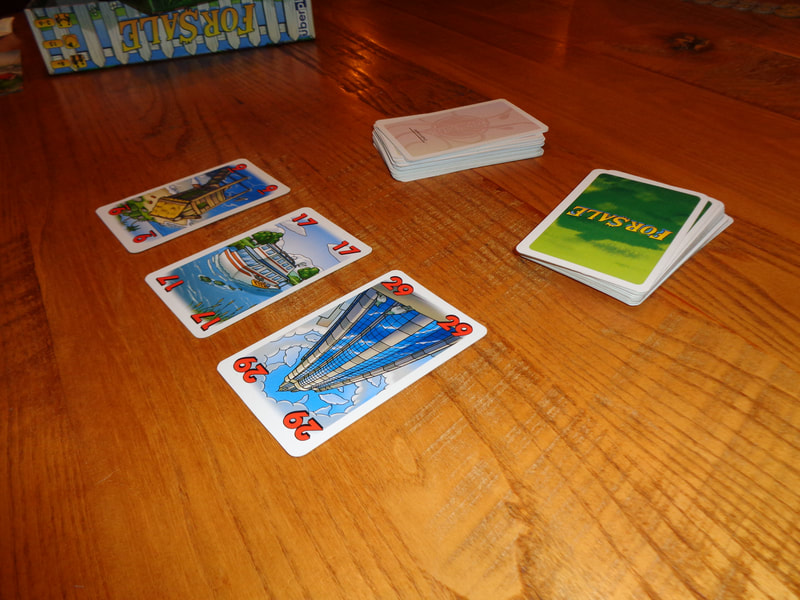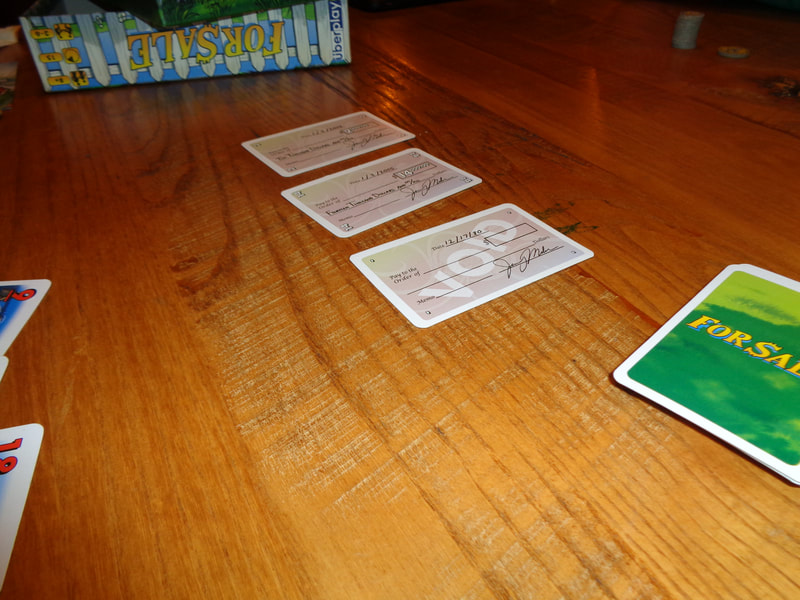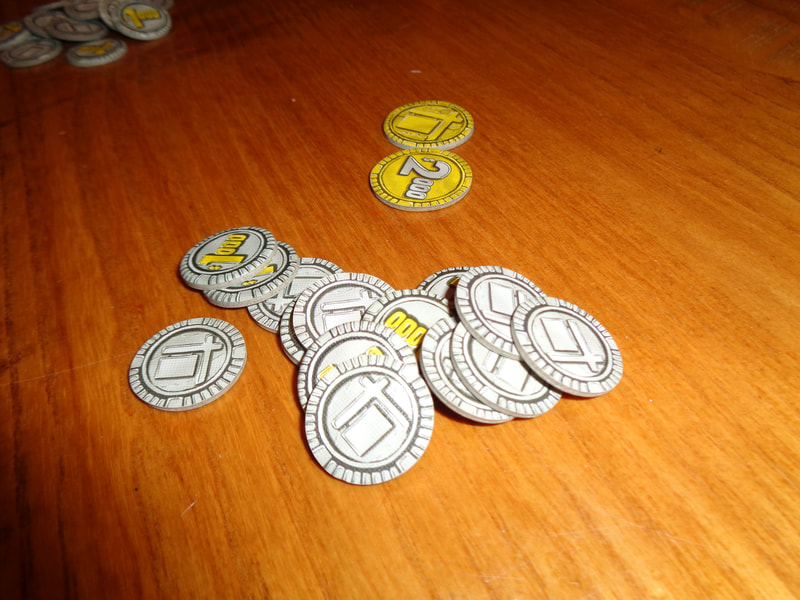|
25th July 2021 Sunday gaming on Board Game Arena continued with our next game. If Esther Rantzen ever made board games, it probably wouldn't be this one, for starters, there's no dog that says 'sausages'! Caveat: We have only ever played That's Life! digitally online. What's in a game? That's Life! is all about travelling along a route consisting of a series of randomly placed hexagonal tiles, where the bad ones outweigh the good ones, generally trying to manage those bad situations with a bit of luck and occasionally encountering generosity or greed. Maybe that really is what life is all about?
How's it play? Setup
On to play The goal in That's Life! is to journey to the game's end, acquiring those scoring tiles as you go while trying to avoiding those minus tiles. How's this done?
Endgame Play continues until all players' meeples have crossed the finish line. Each lucky tile acquired by a player can now used to convert the score from a minus tile into a plus, then all points are tallied, highest score wins. Overall
There's no getting away from that fact that this is a roll and move game, it may give you 2 or 3 choices from that roll, but it still is what it is. That's not to say it's all bad, usually at least 1 of the 2 or 3 choices a player is given is meaningful. Finding a way to linger on a plus tile until other players have to leave (Or getting off the tile before other players even arrive!) will earn victory points and players will obviously also want to avoid the minus tiles. However, minus tiles sort of reverses this, players will look to linger on a bad tile in the hope that another player will land it, allowing them to potentially escape. Furthermore, minus tiles outnumber plus ones 18-to-8; that's more than double, landing on them is inevitable, so is picking them up. This is what makes the lucky tiles such gamechangers with their ability to mitigate negative penalties, if a player has a lucky tile in their stack, suddenly that big minus tile becomes an asset, provided of course someone doesn't steal the lucky tile in the meantime. All of this is also largely dependant on what other players do, because they'll also be trying to linger on good tiles and escaping bad ones. That's Life! is a very easy game to learn and comprehend. I feel that it will have crossover appeal to non-gamers but for us, it felt a little too light and a little too luck-based; because players invariably end up collecting more negative tiles than positive, it ends up lending the game a negative feel - even though generally it will affect all player equally (Maybe life is like that?). It meant we didn't find That's Life a satisfying experience or a compelling game.
0 Comments
25th July 2021 Sunday gaming on Board Game Arena continued with Bang! The American west could be an ornery, dangerous place; friend or foe, it was always hard to tell, particularly when you all sat in circle and pointed pistols at each other, with nothing else but a spittoon between all of you. Caveat: We have only ever played Bang! digitally. What's in a game?
How's it play? Setup
On to play The main purpose in Bang! is to attack your enemies and aid your allies (If you have any.)! This is is not quite so simple as it sounds though, since it's unlikely that players will know who is an enemies or a friend, at least at the start. Additionally, you may not even be able to reach you enemies, most attacks in Bang! have a range of 1, this means an attack can only target someone 1 space away, i.e., someone adjacent, there are several weapons have extra range and there're also ways to alter ranges. A turn in Bang! consists of 3 actions.
Endgame In Bang!, play continues until one of three win conditions are met, these win conditions will depend what hidden role players have. Sheriff/deputies: All outlaws and the renegade must be eliminated for the sheriff/deputies to win. Outlaws: Eliminate the sheriff and the outlaws win. Renegade: Win by being the last man standing. Overall
Bang! is a pretty straightforward hidden role game, however, unlike some hidden role games, most of the game's 3 factions will start not knowing who their allies might be, with exception of deputies and the renegade (Who has no allies.). Players will need to observe other players' behaviour to try and gauge their motives, this is made more difficult because the renegade will be looking help or hinder either of the other factions depending on the situation, adding to this are the range restriction rules that can force players to change behaviour. Additionally, in Bang! actions are card driven, i.e. a player's decisions will be to some degree limited by the cards in their hand; no BANG! card - no attack for example, this can mean even more restrictions on player choices. We found this made for a slightly unsatisfying experience, particularly since there's a a fairly strict rule on hand size and it becomes a case of use-it-or-lose-it with cards. It didn't help that sometimes it felt like the card play made the game a little futile, managing to play a Bang! card only for your target to immediately heal it made for a negative feeling. We played Bang! with a lower player count and online; with more players and in-person play I'm sure that it would've been a different experience, a game like Bang! will thrive with more players. I'm not the biggest fan of hidden role games and I don't think Bang! is a bad game but I can think of other similar games I'd rather play - including it's later companion game; Bang! The Dice Game. 25th July 2021
It's a Sunday and I'm logged into Board Game Arena on my PC, time for some gaming goodness. First up is Happy City, read my thoughts about it here. 20th July 2021 I'm in Woking at the Sovereigns with the Woking Gaming Club. The second and final game of the evening was For Sale; time for some property flipping and stressful auctioning action. What's in a game? For Sale is a card game and comes with 2 types of cards.
Artwork on the property cards is pretty good, colourfully depicting 30 different properties ranging from a lowly cardboard box for the 1 card to an orbiting space station for the 30 card. The currency cards all identically depict cheques of various values There's not much else to say here. How's it play? Setup
For Sale is played over 2 phases, in the 1st, players use their money to buy properties and in the 2nd, they use these to get currency cards, essentially flipping the properties for profit. Phase 1: Buying properties.
Phase 2: Flipping those properties.
Endgame Players tally the values of all the currency cards they acquired and any coins that were unspent from phase 1. Highest score wins. Overall
For Sale is a simple game to play, it features two types of auctioning that're easy to understand, however there are a couple of curveballs that that affect the game's dynamic. Firstly in phase 1; which is an open auction, there's the rule that states when a player passes, they only get half their bid back and the lowest valued card. It means the classic play of trying to run up someone else's bid is a risky proposition, you may well end up running yourself up for a very low value card as well. Even the act of initially bidding may cost a player more than they want to spend, it's something player's need to think about. All the property cards drawn have to be acquired by players and it may not seem like it, but sometimes a lower valued card can end up generating more profit. Why? Because the value of a card does not necessarily dictate its worth. This brings me to phase 2; the blind auction. This is where player's sell their properties to get profit, however the profits that players can potentially generate will contextually change from round to round and depends on the currency cards drawn. No matter how much you paid for a property card, when you use it, it will only generate income according to the currently drawn currency cards. This is where players have to start watching what other players will do and know when to push high or low valued property. If a $15,000 currency card had been drawn and you know another player has the 30 point property card, you know they're going to play it - it guarantees them the $15,000 card, so is it a good time for you to use a high value card? On the other hand, the 2nd highest might be worth it, or it might be not. Conversely; in some circumstances, the lowest value cards can have great worth, if all the currency cards drawn are high value, it can be a good time to play lower value cards, remember it's all about profit not value. A 30 point property card that costs $8,000 and nets a $15,000 currency card, generates a profit of $7,000. If 1 point property that cost 0 because somebody passed and took it for free is used to get a $8,000 property, then that's $8,000 profit! This example is extreme and doesn't realistically occur too often, but the principal is sound; if demand is high (Multiple high value currency cards are drawn.), then it's time to push your lowest value properties for maximum profit; capitalism at its finest! Conversely, if there are fewer high value currency cards out there, playing a high value property at the right time will outbid other players and score the maximum profit. All this makes For Sale a very situational, essentially contextually-driven game about managing the game's inherent unpredictability and adapting when it's called for. It becomes about not only knowing when to play which cards, but also watching what properties other players have and trying to predict their strategies, which can profoundly effect yours. I have love/hate relationship with auction games, the unpredictably always worries me and For Sale is more unpredictable than most in my opinion. Even so, it's an enjoyable game and definitely worth a try, if you're a fan of auction games, you should really try it. 20th July 2021
It's a Tuesday evening and after a blip, I'm back in at the Sovereigns in Woking with the Woking Gaming Club. The first game of the evening was the awesome Pan Am, read my thoughts about it here. 18th July 2021
The final game of gaming Sunday on Board Game Arena is Happy City. Read my blog about it here. 18th July 2021
It's a Sunday evening and gaming continues on Board Game Arena. Next is Railroad Ink, read my blog about it here. 18th July 2021
Codex Naturalis was the next game of the evening on Board Game Arena. Read my blog about it here. 18th July 2021
Another Sunday means more gaming on Board Game Arena. The opening game of the evening was Love Letter, read my blog about it here. 18th July 2021
It's a Sunday evening and I'm logged into Board Game Arena for some more gaming fun. The first game of the night was Fluxx, read my blog about it here. |
AuthorI play, I paint. Archives
March 2024
Categories
All
|




 RSS Feed
RSS Feed
